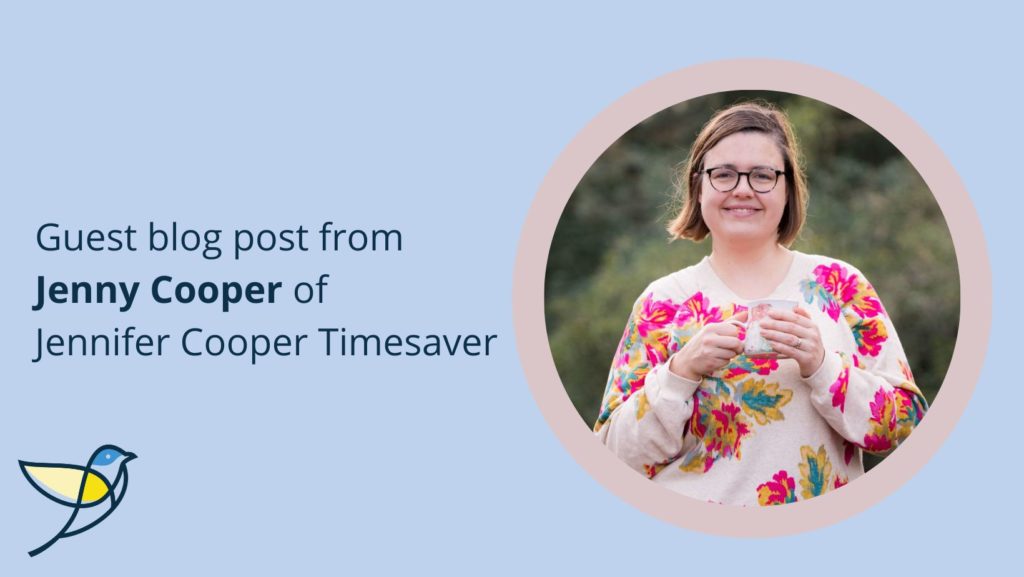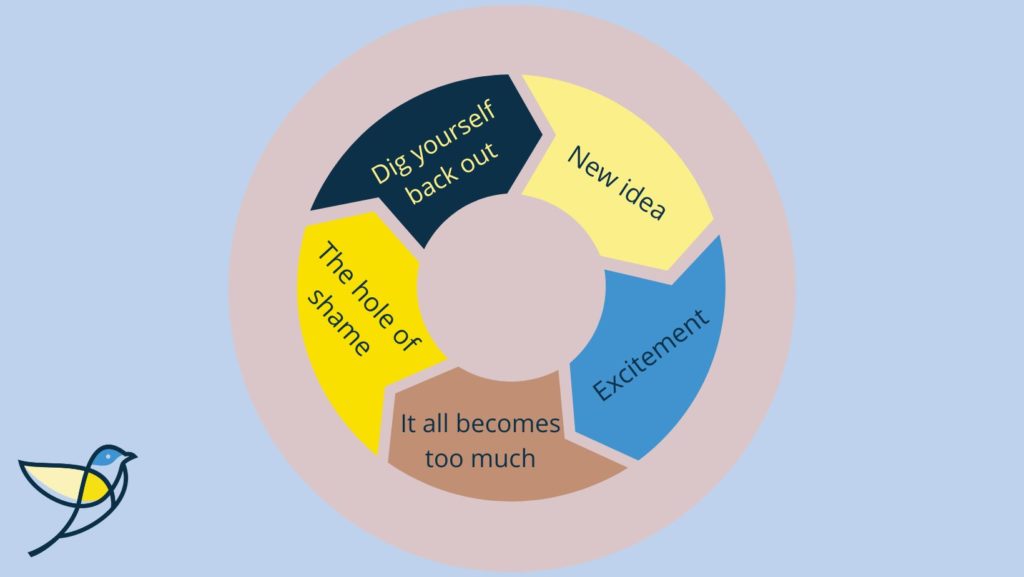
Jenny Cooper is the founder of Jennifer Cooper Timesaver and the Kindred Spirits community, providing gentle business guidance & mentoring, business support services, strategies and online visibility. Through her own experiences and her experiences working with clients, she has plenty of insights into teasing admin cooperation out of a creative brain. Thank you so much to Jenny for sharing her thoughts with the Clear Day community!
***************************
Creativity or ADHD?
I do not have an ADHD diagnosis, but when I was researching ADHD for my daughter I found that I was ticking off a lot of the things mentioned for myself. I suffered a head injury a few years ago, and the information I was reading also made it clear that ADHD or ADHD-like symptoms can be brought on by head injury. So what I was experiencing started to make sense to me.
Do you get stuck in that emotional cycle of beating yourself up? Negative self talk like “why can’t I do this thing everyone else can do?” “Why is this such a struggle for me?”
It could be that your brain just works differently. I haven’t really wanted to get stuck in the ADHD part of it, the books, the medical explanations, I’m not so interested in that. For me, it’s much more like “Right, okay, now I understand what this is, what tools are there to help me?”. I am building my toolkit for the way that my brain now works.
What helps?
- Accountability – I struggle to motivate myself to exercise, but if I pay a personal trainer I don’t want to let her down because she’s a friend and I respect her.
- Body doubling – it’s not a phrase I like, but it basically means not doing it on your own. Sitting and working with someone else or a group of other people. I champion this through my Kindred Spirits co-working community.
I don’t understand time the way other people do!
It’s called Time Blindness. I can get hyper focused where I’m really in the flow and I don’t realise how much time has gone by. I find it really difficult to estimate how long has passed. I feel like I see time in 2D rather than 3D. I am constantly fighting against being late, and that was not an issue before I had my head injury and related ADHD symptoms. Understanding how long tasks will take is a huge struggle.
Do you find that even if you know there is a way to work out how long something will take, your brain just won’t go down that logical route? You try to find ways around it and find it hard to accept that you just need to do the logical thing?
Yeah, me too.
What helps?
- Visual timers. Watching numbers count down means nothing to me, but I have a visual timer on my phone which shows a line of time getting smaller, and that I can understand.
- Diary support. My VA helps me to manage my diary, she spots when things are double-booked, when I am likely to need downtime with no appointments and when I might need extra time for things.
Shiny Object!
It’s quite hard to think in a linear way, and very easy to get excited about the new shiny object. It’s a superpower because our creativity is off the charts, we are bursting with ideas, but then following through is a real challenge. Short quick tasks are okay, but what’s really hard is sustaining motivation over long-term projects. In my head, a six-month project is already done and signed off, when in reality I haven’t done anything on it yet, and trying to stay interested is really, really hard.
Do you get more distracted by the shiny thing when you are tired? Same here.
If I’m ‘on it’, I can go into my emails, find the information I want and come out of my inbox again without getting distracted. If I’m tired though I can do the same thing and lose 10-15 minutes in my inbox getting distracted. Then I don’t know what I’m supposed to be doing, I get distracted by the shiny thing, and then ultimately it’s all too much and I need to scroll on Instagram to calm down my brain.
What helps?
- Chunking down the project can help to keep your brain on track. Breaking down horrible tasks to small, gentle tasks that you can work through one at a time.
- Accepting that you will want to change things up quite often. I have a variety of planners and I hop between them. Some weeks it will be about stickers, some weeks it will be about highlighters and some weeks could be about post-its. It’s what I need to do to keep my brain engaged.
- Sleeping on it before you make big expensive decisions. It can be so easy to spend money on the next shiny thing as a way to avoid doing the much harder work on yourself.
It’s got to be perfect!
Then of course there’s the perfectionism. I have a tendency to make everything bigger than it needs to be and sometimes that’s brilliant. Sometimes though it means I never get around to things. If you ask me for a testimonial I should just be able to write a testimonial. Getting a testimonial out of me is hard though because in my head I will write you the best testimonial you have ever had that will make you and everyone who reads it cry, then that becomes a big thing, then that takes a lot longer to do. I think that’s quite common with ADHD. We find it hard to “just do it”, and I think it’s to do with overcompensating for what we see as our failings.
Then as soon as I get behind on anything, because I’ve made it too big or because I got distracted, I basically hit the wall of awful. It’s just got too big, too scary. So procrastination and inaction is really common.
Does this look familiar?

I know people who have been in procrastination shame loops for two years. It just gets bigger and bigger and the longer you’ve been in that loop over a task or project the harder it is to break it down into what needs to be done.
What helps?
Learning to recognise the signs. I am getting better at recognising when my brain is just ‘off’ and I need to shut down the laptop and take 20 minutes to do something else, instead of fighting with myself.
Rather than pushing through then not getting anything done and being more exhausted then beating yourself up, take a break and then come back and you’ll get the job done quite quickly.
But I am so organised!
Quite often as women with ADHD we come up with systems to mask it. People always say to me ‘you’re really organised’ and I am good at organising other people. How can I be doing the work that I do with ADHD? I remember having a conversation with an American woman who has done huge conferences with professional organisers, and she said that at least half of professional organisers most likely have ADHD. They are good at what they do because they have had to come up with systems that work for them. Having ADHD does not mean that you have to be chaotic, it’s about learning to work with your brain.
How you can work with me…
I do accountability weeks where we’ll look at your list and we’ll make a plan to work through it. I’m doing one at the moment and I’ve just had another client who wants me to co-work to help her to get her social media done.
I get it, I’m gentle, and I will help you to get the things done.
You can get in touch with me here.
I can also highly recommend the How to ADHD YouTube channel for great information and explanations.
The way your brain works is your superpower. You don’t need to feel ashamed. Forgive yourself and embrace who you are. We can do it together, I’m still working on it too.
Jenny Cooper
Jennifer Cooper Timesaver
March 2023
